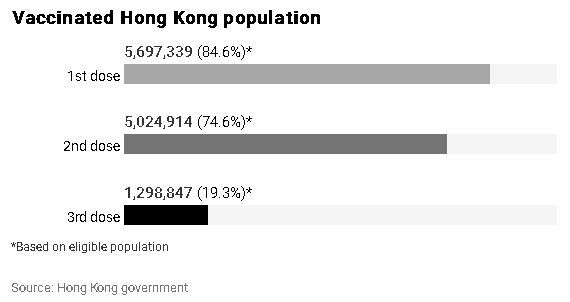Hong Kong News

‘Panicking’ Hong Kong parents rush to book Covid-19 shots for young children
Covid-19 vaccinations for children have risen sharply amid Hong Kong’s worsening fifth wave of coronavirus cases, with bookings boosted by an earlier government decision to lower the eligibility age for Sinovac shots to three years from Tuesday.
Family doctors and paediatric experts have reported a surge in vaccinations for children, with one medical professional suggesting the recent coronavirus-related death of a four-year-old boy could have been a contributing factor.
Paediatrician Dr Alvin Chan Yee-shing, co-chairman of the Medical Association’s advisory committee on communicable diseases, said parents had gone into “panic” mode.
He said the number of parents inquiring about vaccinations for their children had risen rapidly over the past several days, while bookings were almost full until early next month.
But Chan said some parents still had concerns about any potential side effects from the vaccines and had mentioned them during their inquiries.
“They ask questions before inoculations, like whether it matters if their child has a history of allergies or chronic illnesses,” he said.
Authorities announced on Sunday that the inoculation age for the mainland Chinese-made Sinovac jab would be lowered from five to three years as of Tuesday, while children aged five to 11 will be able to receive the German-produced BioNTech vaccine.

From Tuesday, the Sinovac vaccine will be available to all children at three vaccination centres, five student health service centres, 14 public clinics and about 1,000 private clinics.
Vaccination uptake among all age groups has surged after daily coronavirus caseloads skyrocketed to as high as 2,071 on Monday. About 83.5 per cent of the city’s eligible population have received their first jab, while 74.3 per cent have taken a second dose.
About 80 per cent of residents aged 12 to 69 have taken one dose of a vaccine, with the 12-19 age group reaching an 87.9 per cent inoculation rate.
The 40-49 and 50-59 age groups have reached 94.8 and 90.2 per cent respectively after receiving their first vaccine dose.
Dr Edmund Lam Wing-wo, a family practitioner, said parents appeared to be “supportive” of the decision by authorities to offer jabs to young children.
“Those parents wanted to prevent their kids from getting serious infections without vaccination due to the increasing infection numbers,” he said.
Lam said he had received more than 10 appointments for children aged three to five years old by noon on Tuesday, nearly surpassing the daily number of bookings for children of all ages over the past two weeks.
The surge followed reports from health officials that dozens of cases during the fifth wave were below the age of five.
Private paediatrician Henry Yeung Chiu-fat said he was now working 15 hours a day because of an increasing number of requests from residents to get inoculated.
He said among the about 200 people who came to his clinic in Tsing Yi every day to get their jabs, about 30 per cent were children aged below 11.
“We spent more time checking the four-page parent consent forms before the vaccination of their kids,” he said, calling for the paperwork to be simplified to improve efficiency.
Housewife Leung Yuk-lan, 37, said she had booked a Covid-19 shot for her three-year-old daughter in April. She previously decided to give herself time to consult a paediatrician.
Leung said she had been worried about any possible side-effects on her daughter, who has a common genetic enzyme disorder known as G6PD deficiency.
However, Leung said she would go through with the booking after hearing about the four-year-old boy’s virus-related death last week.
“I am more concerned about my child’s condition if she got infected than the side effects of the vaccine,” she said.
Parents, meanwhile, have urged the government to increase the number of available reservations at vaccination centres.
Teacher Eva Cheung, 36, complained about the designated vaccination centre near her home in Tuen Mun being unable to offer any appointments until April.
“Parents need to bring their children across the city for vaccination, which will lead to the risk of cross-infection,” Cheung said.
“Has the government prepared for the extended arrangements for children? I don’t think so.”











